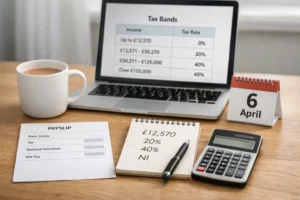As the UK government prepares to implement tax changes for 2025, one of the most significant alterations is the increase in the UK Personal Allowance. For taxpayers across the country, understanding these changes is crucial. How will the UK Personal Allowance Tax Raise 2025 affect your personal finances? And what does this mean for your taxes going forward?
This article explores the upcoming tax changes, explaining how the personal allowance increase will influence different income brackets. Whether you are a low, middle, or high-income earner, these changes could have a significant impact on how much you pay in taxes.
Table of Contents
ToggleWhy Should You Care?
The 2025 tax reforms offer financial relief to millions of taxpayers. If you’re currently managing your finances and tax obligations, understanding how the personal allowance increase UK will work is essential for effective tax planning. By knowing exactly how these changes will impact your income, you can make more informed decisions and adjust your financial strategy accordingly.
Understanding the UK Personal Allowance Tax Raise 2025
Before we delve into the specifics, it’s important to define what the Personal Allowance is and what the tax raise in 2025 will entail.
What is Personal Allowance?
In simple terms, the Personal Allowance is the amount of income you can earn before you start paying income tax. For many UK taxpayers, this figure has been a pivotal aspect of their annual income tax planning. Currently, the standard personal allowance is £12,570, which means you do not pay tax on earnings up to this amount.
What is the UK Personal Allowance Tax Raise 2025?
The UK Personal Allowance Tax Raise 2025 refers to the increase in the amount of income that will be tax-free starting in 2025. The government has announced an adjustment to this figure, raising it to provide immediate financial relief to the nation’s workers.
This increase in the personal allowance threshold is part of broader UK tax changes in 2025 designed to ease the financial pressure on taxpayers across various income brackets.
Breakdown of the UK Personal Allowance Tax Raise for 2025
So, what exactly is changing in 2025?
Personal Allowance Increase Amount
Starting in 2025, the UK government will raise the personal allowance threshold from £12,570 to £13,000. This is a £430 increase in the amount of income that is exempt from tax, which could have a notable impact on your take-home pay, depending on your earnings.
How This Will Affect Different Income Brackets
This increase in the personal allowance will have varying impacts based on your income bracket. To clarify the situation, let’s break down how these changes will impact income tax rates for different earners.
Here is a table summarising the current situation compared with what will change in 2025:
| Income Bracket | Current Personal Allowance | 2025 Personal Allowance | Change in Taxable Income |
| Up to £12,570 | £12,570 | £13,000 | £430 Increase |
| £12,571 to £50,270 | £12,570 | £13,000 | £430 Increase |
| £50,271 and above | £12,570 | £13,000 | £430 Increase |
As you can see, the increase applies to all income levels up to the higher rate tax band (£50,270). However, the impact may be more noticeable for lower- and middle-income earners who will see a more significant reduction in taxable income.
How the Personal Allowance Raise Affects Your Taxes
Impact on Low-Income Earners
If you earn below the personal allowance threshold (£12,570), the personal allowance raise will have a more significant impact. Individuals earning £13,500, for example, will see less of their income taxed. With an increased threshold of £13,000, £430 of their income will be exempt from taxation, resulting in a reduction in their overall tax liability.
Impact on Middle-Income Earners
For those earning between £12,570 and £50,270, the increase will have a slightly different effect. Let’s take an example: If you earn £25,000 annually, the increase in the personal allowance means that £430 more of your income will not be taxed. While this might not seem like a large sum, it could still mean more disposable income for you.
Impact on High-Income Earners
For high earners, those making over £50,270, the effect of the personal allowance raise will be somewhat muted. The primary change here is that the £430 will reduce the amount of your income that is taxable at the basic rate. However, for those in the higher tax bands (40% or 45%), this change will have a less significant impact on your overall tax bill.
Financial Benefits of the Tax Raise
The raise in the personal allowance will certainly have a positive impact on the financial wellbeing of UK taxpayers. Here’s how it can benefit you:
Immediate Financial Relief
The personal allowance tax raise provides immediate financial relief to all taxpayers, but especially for lower-income earners. With a larger portion of income falling under the tax-free threshold, taxpayers will have more disposable income to spend or save.
Impact on Disposable Income
For many taxpayers, the extra £430 can significantly boost disposable income. Whether you are looking to increase your savings or spend on essential goods and services, this extra amount could give you greater flexibility.
Savings Potential
Having more disposable income opens the door to better savings opportunities. You may be able to contribute more to retirement savings or use the extra funds to invest in long-term goals, such as home ownership or educational expenses for your children.
Broader Economic Impact of the UK Personal Allowance Tax Raise
The UK Personal Allowance Tax Raise 2025 is not just about individual financial benefits—it also has broader economic implications. Here are a few potential impacts:
- Increased Consumer Spending: With more disposable income, consumers are likely to spend more, leading to a boost in demand for goods and services.
- Potential for Increased Savings: Lower- and middle-income earners may take advantage of the increase to save more, contributing to overall economic stability.
- Higher Business Demand: With increased disposable income comes greater demand for products and services, which could lead to a boost in the UK’s economy.
- Government Spending: The government may see changes in tax revenues as a result of the increased personal allowance, impacting future fiscal policy decisions.
How to Adjust to the Tax Raise
As with any significant tax change, it’s important to adjust your financial strategies accordingly. Here are some practical tips to make the most of the personal allowance raise:
Review Your Budget
Take the time to review your budget and plan accordingly. If you are now earning more disposable income due to the tax changes, you may want to allocate this extra money for savings or other financial goals.
Plan for Long-Term Goals
Consider saving any extra income for long-term financial objectives such as retirement or home ownership. The more you can contribute to these goals now, the better off you’ll be in the future.
Explore Tax Planning Strategies
Explore tax-efficient strategies like salary sacrifice schemes, ISA investments, or pension contributions to make the most of your additional income. These strategies can help reduce your overall tax burden and allow you to benefit from compounding growth in your savings.
Frequently Asked Questions (FAQ)
How much more can I earn without paying tax after the raise?
With the personal allowance raised to £13,000, you can now earn £13,000 annually without paying income tax.
Will the personal allowance raise affect my pension contributions?
The personal allowance increase does not directly affect pension contributions. However, it may allow you to allocate more funds to your pension savings, especially if you are saving tax-efficiently.
How do I calculate my new tax liability after the raise?
To calculate your new tax liability, subtract the personal allowance of £13,000 from your total income. The remaining amount will be subject to income tax at the applicable rate.
Are there other tax changes expected in 2025?
While the personal allowance increase is one of the major tax changes in 2025, it is likely that other reforms will be announced. Keep an eye on official government announcements for further details.
Conclusion
In summary, the UK Personal Allowance Tax Raise 2025 is an important development that will have far-reaching effects on your taxes. Whether you’re a low, middle, or high-income earner, this tax change will provide immediate financial relief by increasing the amount of income that is tax-free.
Understanding these changes is essential for effective tax planning, and adjusting your financial strategy can help you maximise the benefits of this increase. If you need more personalised advice or want to review your financial situation, contact a tax professional today.
Call to Action:
If you’re unsure how the UK Personal Allowance Tax Raise 2025 will affect your specific tax situation, get in touch with Bloom Financials today. Our experts are here to provide you with personalised tax advice and help you plan for a more financially secure future.





